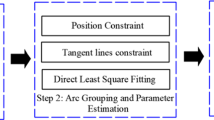Abstract
In the task of ellipse detection, the edge pixels that share the similar elliptic convexity are identified and combined to produce a potential ellipse. Due to the discreteness error and various kinds of image noise inherited in real-world images (e.g., the noise caused by compression attack and low-illustration), some of these elliptic edge pixels might deviate from the positions they supposed to be. Consequently, the ellipse detectors could have inferior performance in terms of precision and recall rate. For that, the existing ellipse detection methods always apply a Gaussian smoothing to the input image before the detection procedure. Due to the scale value (i.e., the standard deviation of Gaussian kernel) needs to be determined in advance, the existing single-scale ellipse detectors still suffer from the inferior precision and recall rate issues. To simultaneously solve these issues, a multi-scale strategy is innovatively developed for ellipse detection, based on which a novel multi-scale ellipse detector (MSED) is proposed. In our MSED, the elliptic edge pixels at multiple scales are jointly used to produce ellipses with high quality. For that, the ellipses detected at multiple scales are first produced, followed by merging them with a new multi-scale ellipse merging approach. In this approach, a probabilistic model is developed, based on which the homologous ellipses at multiple scales are merged. Lastly, a multi-scale ellipse validation check is further developed to discard those merged ellipses that have low confidence. Extensive experimental results show that our MSED outperforms the current state-of-the-arts and is robust to noise.
This work was supported in part by the Natural Science Foundation of the Jiangsu Higher Education Institutions of China under Grant 21KJA520007, in part by the Collaborative Innovation Center of Novel Software Technology and Industrialization and in part by the Priority Academic Program Development of Jiangsu Higher Education Institutions.
Access this chapter
Tax calculation will be finalised at checkout
Purchases are for personal use only
Similar content being viewed by others
References
Arellano, C., Dahyot, R.: Robust ellipse detection with Gaussian mixture models. Pattern Recognit. 58, 12–26 (2016)
Canny, J.: A computational approach to edge detection. IEEE Trans. Pattern Anal. Mach. Intell. 8(6), 679–698 (1986)
Cholewiak, S.A., Love, G.D., Srinivasan, P.P., Ng, R., Banks, M.S.: ChromaBlur: rendering chromatic eye aberration improves accommodation and realism. ACM Trans. Graphics 36(6), 1–12 (2017)
Das, P.K., Meher, S., Panda, R., Abraham, A.: An efficient blood-cell segmentation for the detection of hematological disorders. IEEE Trans. Cybern. 52(10), 10615–10626 (2021)
Dong, W., Roy, P., Peng, C., Isler, V.: Ellipse R-CNN: learning to infer elliptical object from clustering and occlusion. IEEE Trans. Image Process. 30, 2193–2206 (2021)
Fornaciari, M., Prati, A., Cucchiara, R.: A fast and effective ellipse detector for embedded vision applications. Pattern Recognit. 47(11), 3693–3708 (2014)
Jia, Q., Fan, X., Luo, Z., Song, L., Qiu, T.: A fast ellipse detector using projective invariant pruning. IEEE Trans. Image Process. 26(8), 3665–3679 (2017)
Kothari, R.S., Chaudhary, A.K., Bailey, R.J., Pelz, J.B., Diaz, G.J.: EllSeg: an ellipse segmentation framework for robust gaze tracking. IEEE Trans. Visual Comput. Graphics 27(5), 2757–2767 (2021)
Lu, C., Xia, S., Shao, M., Fu, Y.: Arc-support line segments revisited: an efficient high-quality ellipse detection. IEEE Trans. Image Process. 29, 768–781 (2020)
Lu, W., Tan, J.: Detection of incomplete ellipse in images with strong noise by iterative randomized Hough transform (IRHT). Pattern Recognit. 41(4), 1268–1279 (2008)
Lu, Y., Jain, R.C.: Behavior of edges in scale space. IEEE Trans. Pattern Anal. Mach. Intell. 11(4), 337–356 (1989)
Martorell, O., Buades, A., Lisani, J.L.: Multiscale detection of circles, ellipses and line segments, robust to noise and blur. IEEE Access 9, 25554–25578 (2021)
Meng, C., Li, Z., Bai, X., Zhou, F.: Arc adjacency matrix-based fast ellipse detection. IEEE Trans. Image Process. 29, 4406–4420 (2020)
Meng, C., Li, Z., Sun, H., Yuan, D., Bai, X., Zhou, F.: Satellite pose estimation via single perspective circle and line. IEEE Trans. Aerosp. Electron. Syst. 54(6), 3084–3095 (2018)
Panagiotakis, C., Argyros, A.: Region-based fitting of overlapping ellipses and its application to cells segmentation. Image Vision Comput. 93, 103810 (2020)
Prasad, D.K., Leung, M.K., Cho, S.Y.: Edge curvature and convexity based ellipse detection method. Pattern Recognit. 45(9), 3204–3221 (2012)
Rosin, P.L.: Ellipse fitting using orthogonal hyperbolae and stirling’s oval. Graph Models Image Process. 60(3), 209–213 (1998)
Shen, Z., Zhao, M., Jia, X., Liang, Y., Fan, L., Yan, D.M.: Combining convex hull and directed graph for fast and accurate ellipse detection. Graph. Models 116, 101110 (2021)
Wang, T., Lu, C., Shao, M., Yuan, X., Xia, S.: ElDet: an anchor-free general ellipse object detector. In: Proceedings of Asian Conference Computer Vision, pp. 2580–2595 (2022)
Xu, L., Oja, E., Kultanen, P.: A new curve detection method: randomized Hough transform (RHT). Pattern Recognit. Lett. 11(5), 331–338 (1990)
Zins, M., Simon, G., Berger, M.O.: Object-based visual camera pose estimation from ellipsoidal model and 3D-aware ellipse prediction. Int. J. Comput. Vis. 130(4), 1107–1126 (2022)
Zubizarreta, J., Aguinaga, I., Amundarain, A.: A framework for augmented reality guidance in industry. Int. J. Adv. Manuf. Tech. 102(9), 4095–4108 (2019)
Author information
Authors and Affiliations
Corresponding author
Editor information
Editors and Affiliations
Rights and permissions
Copyright information
© 2024 The Author(s), under exclusive license to Springer Nature Singapore Pte Ltd.
About this paper
Cite this paper
Wang, Z., Zhong, B. (2024). MSED: A Robust Ellipse Detector with Multi-scale Merging and Validation. In: Liu, Q., et al. Pattern Recognition and Computer Vision. PRCV 2023. Lecture Notes in Computer Science, vol 14435. Springer, Singapore. https://doi.org/10.1007/978-981-99-8552-4_40
Download citation
DOI: https://doi.org/10.1007/978-981-99-8552-4_40
Published:
Publisher Name: Springer, Singapore
Print ISBN: 978-981-99-8551-7
Online ISBN: 978-981-99-8552-4
eBook Packages: Computer ScienceComputer Science (R0)




